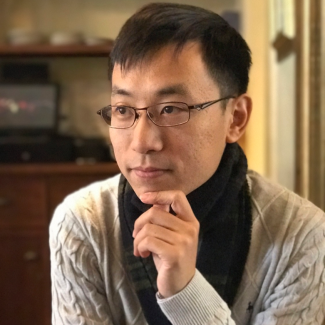Hongbo Yu

Associate Professor
Research Area
Social Psychology
Biography
Dr. Yu received his Ph.D. in psychology in 2016 and his B.S. in physics in 2010 from Peking University, China. His Ph.D. work with Dr. Xiaolin Zhou investigated the neural bases of social emotions (e.g., guilt, gratitude) by developing social interactive tasks that can naturally and repeatedly elicit social emotions in laboratory environments. Shortly after receiving his Ph.D., Dr. Yu joined Dr. Molly Crockett’s lab as a postdoctoral researcher, first at the University of Oxford, where he was awarded a British Academy Newton International Fellowship, and then at Yale University. His postdoctoral research has focused on the neurocomputational mechanisms of moral judgment and decision-making. He joined the faculty at UCSB in 2019.
Research
Emotions can be thought of as “upheavals of thought” (using philosopher Martha Nussbaum’s words). My lab aims to explain the underlying forces that create these mental hills and valleys, and how they shape the landscape of our moral lives. More concretely, we study neurocognitive mechanisms of social emotions (such as guilt and gratitude), their moral significance, and how they are shaped by culture. Complementing these experimental approaches, we also use text analysis and large language models (LLMs) to investigate commonalities and variabilities of emotion and moral concepts throughout history and across cultures. In another line of research, we are interested in how conceptual knowledge modulates our perception of objects, such as human faces (e.g., social trait inference), visual arts and music, and brand logos. We combine LLMs, computer vision models, human behavioral experiments, and multi-modal neuroscience measures to understand how conceptual and physical features of objects are represented and integrated in the brain.
Selected Publications
Ghezae, I., Yang, F., & *Yu, H*. (2025). On the Perception of Moral Standing to Blame. *Open Mind, 9*, 138-168,
https://doi.org/10.1162/opmi_a_00185
*Yu, H*, Gao, X., Shen, B., Yang, H., Zhou, X. (2024). Studying social emotions in Marr’s level of analysis framework. *Nature Reviews Psychology**, 3, *198-213,
https://doi.org/10.1038/s44159-024-00285-1
*Yu, H*., Sun, S., Cao, R., Kar, K., Wang, S. (2024). Multimodal investigations of human face perception in neurotypical and autistic adults*. Annals of the New York Academy of Sciences*, 1531(1), 29-48,
https://doi.org/10.1111/nyas.15084
Chen, AX., Sun, S., *Yu, H*. (2024). Moral attitudes towards effort and efficiency: a comparison between American and Chinese history. *Humanities and Social Sciences Communications*, 11(1085),
https://doi.org/10.1057/s41599-024-03603-3
Zhao, S., Cao, R., Lin, C., Wang, S., & *Yu, H*. (2024). Differences in the link between social trait judgment and socio-emotional experience in neurotypical and autistic individuals. *Scientific Reports*, 14(1), 5400,
https://doi.org/10.1038/s41598-024-56005-5
Hu, Y., Qiu, S., Wang, G., Liu, K., Li, W., *Yu, H*., Zhou, X. (2024). Are Guilt-Prone Power-Holders Less Corrupt? Evidence from Two Online Experiments. Social Psychological and Personality Science,
https://doi.org/10.1177/19485506231168515.
*Yu, H**., Zhou, Y#., Nussberger, A. (**2024**). **Gratitude is morally sensitive**. Personality and Social Psychology Bulletin**, 50(3),** 406-422**,
**https://doi.org/10.1177/01461672221092273
<https://doi.org/10.1177/01461672221092273>*
Shen, B., Chen, Y., He, Z., Li, W., *Yu, H*., Zhou, X. (2023). The Competition Dynamics of Approach and Avoidance Motivations Following Interpersonal Transgression. *Proceedings of the National Academy of Sciences, **120* (40) e2302484120, https://doi.org/10.1073/pnas.2302484120
*Yu, H*., Chen, J., Dardaine, B., and Yang, F. (2023). Moral barrier to compassion: How perceived badness of sufferers dampens observers’ compassionate responses. *Cognition, **237*, 105476,
https://doi.org/10.1016/j.cognition.2023.105476
*Yu, H**., Contreras-Huerta, L. S., Prosser, A. M., Apps, M. A., Hofmann, W., Sinnott-Armstrong, W., & Crockett, M. J. (2022). Neural and cognitive signatures of guilt predict hypocritical blame. Psychological Science, 33(11), 1909-1927,
https://doi.org/10.1177/09567976221122765
<https://doi.org/10.1177/09567976221122765>*
*Yu, H**., Cao, R., Lin, C., Wang, S. (2022). *Distinct neurocognitive bases for social trait judgments of faces in autism spectrum disorder. *Translational Psychiatry, 12(1),* 1-13,
https://doi.org/10.1038/s41398-022-01870-9
*Yu, H*., … Zhou, X. (2022). Explaining individual differences in advantageous inequity aversion by social-affective trait dimensions and family environment. *Social Psychological and Personality Science, 13(2), *626-637,
https://doi.org/10.1177/19485506211027794
*Yu, H*., Siegel, J., Clithero, J., & Crockett, M. (2021). How peer influence shapes value computation in moral decision-making. *Cognition, 211, *104641,
https://doi.org/10.1016/j.cognition.2021.104641
*Yu, H**., Koban, L., … Wager, T.D. (2020). A generalizable multivariate brain pattern for interpersonal guilt. Cerebral Cortex, 30(6), 3558-3572,
https://doi.org/10.1093/cercor/bhz326
<https://doi.org/10.1093/cercor/bhz326>*